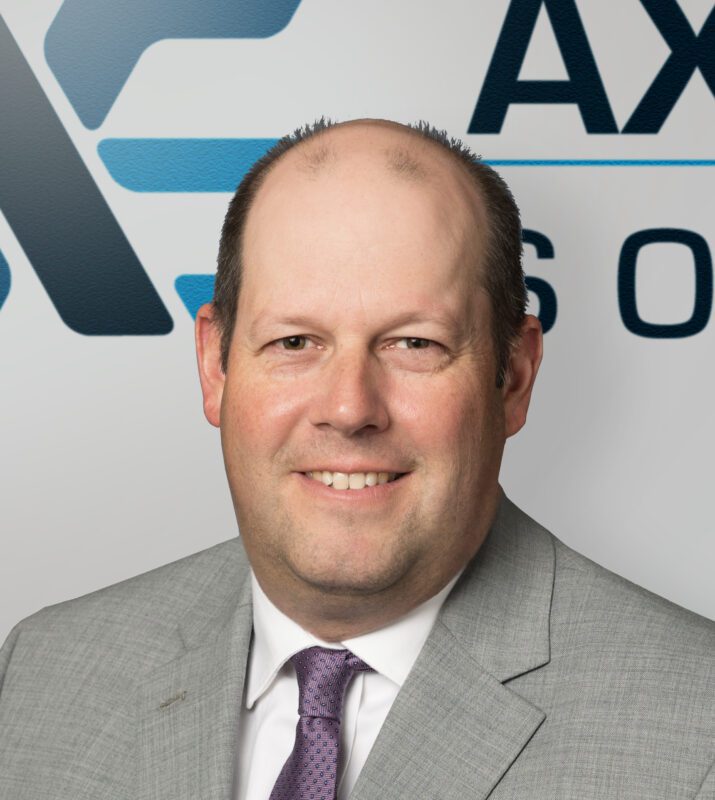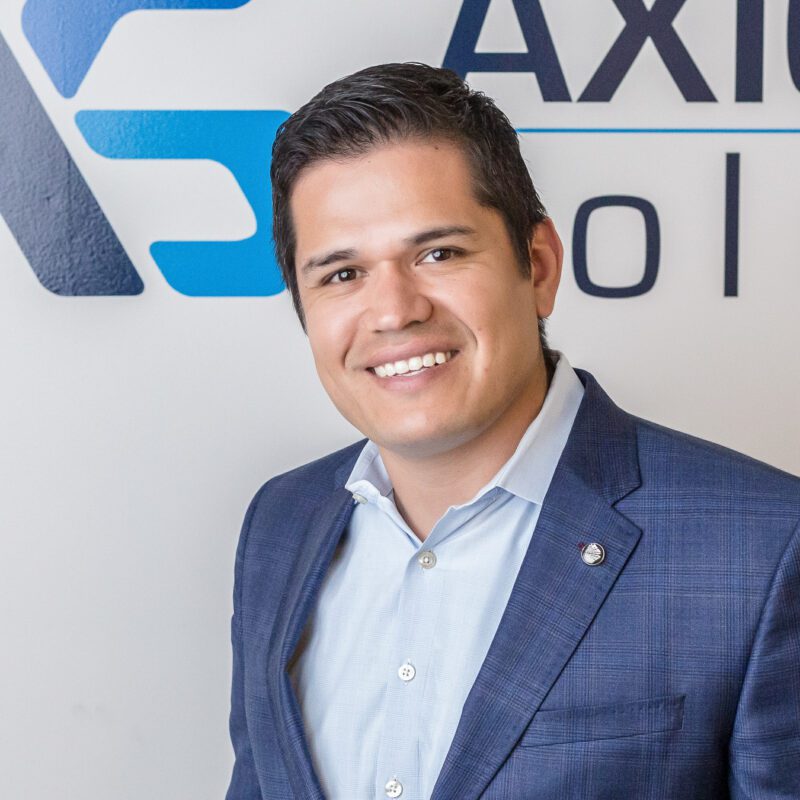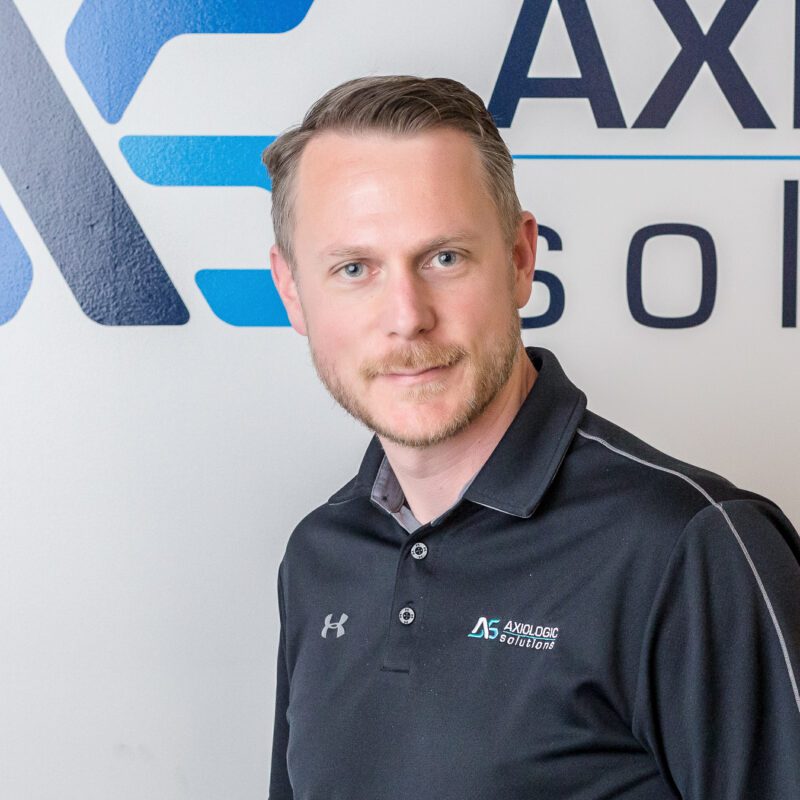
Andy Baratta has always been drawn to the STEM field, thanks to an early introduction to computers and a particular fondness of the 1985 TV series “MacGyver.” And while Baratta wasn’t necessarily a secret agent himself, his extensive career in IT from government to industry has helped him find innovative ways to solve real-world problems.
The systems engineering and IT solutions firm he recently joined is doing the same for its government customers. Baratta is president of Axiologic Solutions, where he leads business development and drives a continued growth strategy for the company, which has rapidly expanded over the past decade.
Before joining Axiologic in April, Baratta spent 25 years delivering IT and engineering solutions to federal customers supporting national security. But a part of his love for engineering stems — no pun intended — from his father, who was the dean of the nuclear engineering program at Pennsylvania State University.
“He introduced me to computers and robotics. I found those to be interesting when computers weren’t mainstream,” Baratta told WashingtonExec.
Baratta also loved chemistry, growing up with the TV series “MacGyver,” and was always computer savvy— so he followed his passions and earned a bachelor’s degree in chemical engineering from the University of Pittsburgh in 1993. Jobs were hard to come by then, so Baratta jumped into an MBA in management information systems, receiving his degree in 1995 from Duquesne University. He also got a master’s degree in computer science from American University in 2000.
While at Duquesne University, Baratta’s interest in IT reignited during a graduate assistantship program running the computer labs.
“I just found a renewed interest and really wanted to do more in the information technology field than I wanted to do with chemical engineering,” Baratta said.
So, when a college roommate started working for the Defense Intelligence Agency, it piqued his interest. That friend recommended Baratta to one of his supervisors and after some government paperwork and interviews, Baratta landed a job there.
Supporting the Mission First
Baratta’s DIA career began on the mission side, supporting the Office for Counter Drug Analysis as a technologist working on IT infrastructure. Eventually, Baratta grew into a team lead within that group.
“I was mentored by two Air Force officers who had an IT background, so that was a big help in my career,” Baratta said. “Our group was actually the first to transition to the Windows operating system at DIA.”
That experience and the recognition from those accomplishments solidified Baratta’s love for doing IT and supporting DIA’s mission. After five years, Baratta accepted a position as the branch chief for DIA’s systems group. There, he assisted the agency in adopting and implementing new technologies like storage area networks, directory services and disaster recovery programs.
After three years, Baratta was promoted to chief of DIA’s Infrastructure Engineering division, overseeing engineering activities for DIA’s chief information officer’s initiatives, and leading the consolidation of various IT entities into an enterprise IT infrastructure.
In 2007, after 11 years as a government civilian and working closely with the government contractor workforce, Baratta was intrigued by the industry and decided to see how life would be on the other side.
“I still wanted to support the mission,” he said. “It was just in a different capacity.”
He first served as a director at Worldwide Information Network Systems, an IT solutions provider. Baratta was an integral member of the account team and vertical business owner of the national security practice within the company. In 2009, he was appointed to vice president of that practice.
In 2011, when WINS was acquired by ManTech, Baratta transitioned to leading the intelligence mission solutions division as vice president. In 2019, he became chief operating officer at Data Analytic Solutions, Inc.
Earlier this year, Axiologic co-founders and Managing Partners Thomas Stauber and Michael Chavira reached out to Baratta with an opportunity to lead and grow their executive team.

Baratta had met the two while working at WINS when Axiologic supported the company on some of its prime contracts. In fact, Baratta remembers when Stauber and Chavira started their firm.
“They had the same goals that I had had when I was at WINS,” Baratta said.
That goal, especially as a former government employee, is to support the mission and safety of the country while helping federal agencies become more efficient.
“That’s very exciting and always has been for me,” Baratta added.
So, he took them up on their offer, and in April stepped into the role of president of Axiologic.
The Axiologic Solutions Story
“Axiologic was founded on the principles . . . of true systems engineering,” Stauber told WashingtonExec.
Stauber and Chavira met in 2007, when they were both enrolled in a systems engineering graduate program at the University of Virginia.

“That’s where we kind of came together on a lot of the concepts that we felt would be good to truly build a company on in this space,” Stauber said. “We were working for traditional contractors, and we saw there were processes, ways of thinking and approaches, that would be great to use in the government space.”
Stauber describes this as a systems approach, and not necessarily an IT systems approach. While most of the work does relate back to IT, the approach can be applied to human resources, acquisitions, logistics and other various functions. Plus, starting from scratch would give them the ability to develop and apply this method in a more cost effective and faster way.
They wanted to solve hard, complex systems engineering problems for the government in a way that would have the largest impact on national security, a mission to which they are both deeply and personally committed.
“As we built out the company, we focused on what a systems engineering firm that’s engaging with the government should look like,” Stauber added. “What skills and characteristics should employees have? What should our solutions look like? And how are we going to scale that? So that’s the principle on which we were founded.”
Axiologic technically launched in 2009, but the company really took off and started bringing in revenue in 2010, according to Chavira.
More significant success came later in 2013, when Chavira said they started shifting their focus from revenue to infrastructure and culture in order to position Axiologic for long-term growth.
“That was a mindset shift we made. And focusing on our culture, I think, was a critical piece of that,” he said.
Maintaining a sense of internal camaraderie was important, too, especially within the leadership team. Some of the members of the leadership team have been with Axiologic since the beginning, forming friendships and growing together professionally as the company has evolved.
“We’re always looking to bring other talent from outside to get a different perspective into our company, making sure that we’re doing those right things,” Chavira said. “When we were looking for a president, Andy was one of the first industry leaders that came to mind.”
Baratta’s experiences working within and with DIA, together with his vast understanding of the marketplace and fit within the Axiologic culture, made him the perfect match.
“We believe Andy will play a critical role in our future growth,” Chavira said.
Baratta also brings a unique perspective on how the government operates, insights into federal decision-making processes and experience supporting the warfighter.
“It’s great to have both experience on the government side and the contractor side,” Baratta said. “I think I can be a resource on understanding some of the challenges the government faces as well as helping the government understand some of the challenges that contractors have. I think it leads to better information sharing and collaboration just to help all around.”
Baratta also has the solutions and systems engineering background that puts him at the forefront of understanding DIA’s innovations.
“Certain customers, they might want to be on the bleeding edge rather than the leading edge, adopting technologies and solutions that have been proven elsewhere,” Baratta explained. And understanding customer needs helps the contractors determine what approach to take.
Baratta stays connected with government customers and industry partners also through membership in various associations, attending government-sponsored conferences, having conversations with customers about their challenges and leveraging relationships he has built over the years in industry and government.
Strengthening Success
It’s easy to define company success by year-over-year growth in revenue and size. But for Stauber and Chavira, the success they find personally rewarding is working with the people who helped get Axiologic to where it is today.
“It’s a process that becomes repeatable, that we know has us set up for long-term success,” Stauber said. The Axiologic team has formed a growing cadre of employees with established values and a shared focus.
“We’ve put ourselves in a position where we have some very smart, talented, loyal people that are amazing and have brought us to where we are today,” Chavira said. “Without them, we wouldn’t be here.”
Going forward, Axiologic will continue growing its presence in the defense and intelligence market. It won’t be a small business for much longer.
“The idea is that we want to continue to provide systems engineering services in a way that gives our customers an edge in the global security environment, as well as growing the business with new customers in that same space and looking at some of the inorganic things we need to do for growth,” Stauber said.
Baratta is personally focused on transitioning the company from a small to mid-tier company that remains competitive among its peers in both segments.
“Some of the biggest things to continue to evolve are our current capability offerings in areas such as data science, system engineering and cybersecurity, as well as developing new capabilities around analytics, machine learning and artificial intelligence,” Baratta said.
As the company’s workforce, solutions and leadership team grow, Baratta said it’s crucial to continue diversifying its customer base, expanding on the company’s reputation and growing existing customer trust.
The Power of Culture
As Axiologic’s leadership team has expressed, culture is an extremely important aspect in the company’s growth and success and continues to be so during the current pandemic.
“We’ve created a very team-oriented culture, and it’s something that we are very proud to have helped create and foster,” Chavira said.
They’ve done so with virtual coffee talks and happy hours, virtual team trivia, and unique ways to give back to and reward employees — most of whom are continuing to work remote — during the unprecedented pandemic challenges.
“As you get larger and larger, it becomes that much more imperative that you need to make sure everything you do, the people you hire, the team you have, the decisions you make, even the work you pursue — all of those things need to be culture-focused,” Stauber said.
That means having a bit of fun, too. Stauber said the corporate team engaged in a five-day competition using a step-counting application to see who could hit 50,000 steps in a day, and the competition got pretty heated, with team members reaching over 100,000 steps.
“There was a constant conversation going on between everyone, and it was fierce,” Stauber said. People would walk every night, on Saturday evenings and even in the rain — all in the spirit of friendly competition and employee engagement.
“It’s fun stuff like that which is keeping us all connected closely together,” Stauber said.

